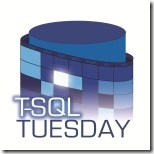This month’s T-SQL Tuesday is hosted by Jeffrey Verheul (@devjef) and is on the topic of Cloud.
I seem to spend quite a bit of my time these days helping people realise the benefit of the Azure platform, whether it be Machine Learning for doing some predictions around various things (best course of action, or expected value, for example), or keeping a replicated copy of data somewhere outside the organisation’s network, or even a full-blown Internet of Things piece with Stream Analytics pulling messages off an Service Bus Event Hub. But primarily, the thing that I have to combat most of all is this:
Do I really want that stuff to be ‘out there’?
People are used to having their data, their company information, their processing, going on somewhere outside the building where they physically are.
Now, there are plenty of times when organisations’ server rooms aren’t actually providing as much benefit as they expect. Conversations with people quickly help point out that their web site isn’t hosted locally (I remember in the late ‘90s a company I was at making the decision to start hosting their web site at an actual hosting provider rather than having every web request come in through the same modem as all their personal web browsing). Email servers are often the next to go. But for anyone working at home, the server room may as well be ‘the cloud’ anyway, because their data is going off to some ‘unknown’ place, with a decent amount of cabling between where they are and where their data is hosted.
Everyone’s photos are stored in ‘cloud’ already, where it be in Instagram’s repository or in something which is more obviously ‘the cloud’. Messages with people no longer just live on people’s phones, but on the servers of Facebook and Twitter. Their worries and concerns are no longer just between them and their psychiatrist, but stored on Google’s search engine web logs.
The ‘cloud’ is part of today’s world. You’re further into it than you may appreciate. So don’t be afraid, but try it out. Play with Azure ML, or with other areas of Cortana Intelligence. Put some things together to help yourself in your day-to-day activity. You could be pleasantly surprised about what you can do.